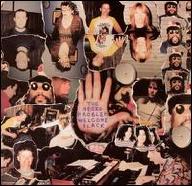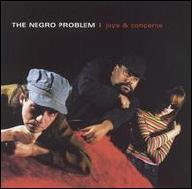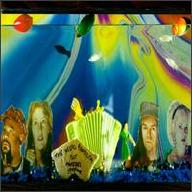Stewart, who goes by the name Stew (at least partially to differentiate himself from the British-born former singer for the Pop Group and New Age Steppers), fills his lyrics with that sort of bracing, ironic wit, and his tunes mix soulful vocals, the muscularity of hard rock and the unabashed prettiness of his beloved Webb (the group did a surprisingly rocking cover of Richard Harris' MacArthur Park on an early single, and Stew counts Webb protégés the 5th Dimension among his all-time favorites) into a trippy but accessible brand of psych-influenced power pop. Surprisingly, Stew did not enter music professionally until his thirties, forming the Negro Problem in 1995 after resettling in the Los Angeles suburb of Silverlake after a period spent living in Europe. The original lineup included keyboardist Jill Meschke Blair, bassist Gwynne Kahn (formerly of the Pandoras), and drummer Charles Pagano, with the Wondermints' multi-instrumentalist Probyn Gregory helping out as an auxiliary member.
The group made their recording debut with an attention-grabbing limited-edition boxed set of five singles in late 1995, following that with the equally eyebrow-raising single of MacArthur Park (changing the key line to "Someone left the crack out in the rain" to illustrate the L.A. landmark's decline) and the A Quick One While He's Away-style multi-part pop-operetta Miss Jones the next year. Both of those songs showed up on the group's full-length debut, Post-Minstrel Syndrome, in 1997, along with 11 other freaky, Phil Spector-on-acid psych-pop gems. The album gains extra emotional heft, however, from the five unlisted bonus tracks: three haunting solo acoustic performances by Stew, the anxiety-ridden full-band performances Camelot and Racket, a mélange of silly on-the-road tape recordings and giggles that are meant as a farewell to the original lineup, which was breaking up as the record was being completed.
Blair was the first to leave, followed by Kahn. A revolving door lineup of temporary keyboardists and bassists (including Gregory and Adam Marsland of Cockeyed Ghost) joined the group on their many tours until former Wednesday Week bassist Heidi Rodewald joined, filling both roles. The second Negro Problem album, 1999's Joys and Concerns, was recorded as a trio with guest musicians. A darker and more foreboding work than Post-Minstrel Syndrome, Joys and Concerns deals in large part with the breakup of Stew's marriage, and was originally recorded as major-label bankrolled demos, which the trio then finished on their own rather than wait for the record company to make up its mind.
Compounding the slow-motion dissolution of the Negro Problem, Pagano left the group in late 1999, although he continued to perform with them on occasion. Stew, with Rodewald's help, recorded and released his first solo album, the critically acclaimed Guest Host, in 2000. Upon its release, Stew announced that the Negro Problem was not breaking up, but that his solo career was meant as a vehicle for the acoustic singer/songwriter-style songs on the first two Negro Problem discs, so that the full-band records could become, in his words, "even freakier." The first test of this was 2002's Welcome Black, a step towards baroque pop that did seem to include more ideas from the band as a whole. ~ Stewart Mason, Rovi





















